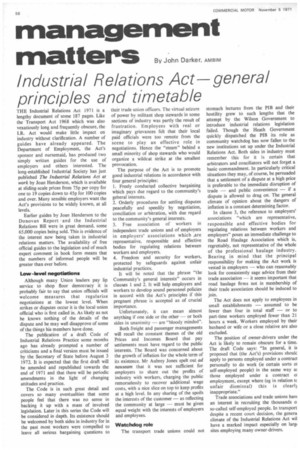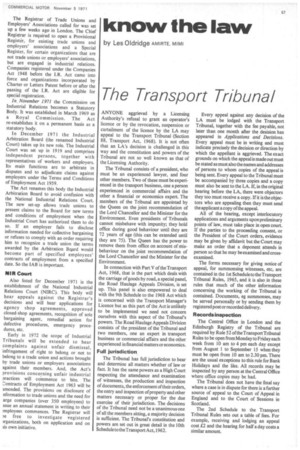management
Page 58

Page 59

If you've noticed an error in this article please click here to report it so we can fix it.
matters By John Darker AM B
Industrial Relations Act general principles and timetable
THE Industrial Relations Act 1971 is a lengthy document of some 187 pages. Like the Transport Act 1968 which was also vexatiously long and frequently obscure, the I.R. Act would make little impact on industry without clarification. A number of guides have already appeared. The Department of Employment, the Act's sponsor and nursemaid, has produced two simply written guides for the use of employers and others interested. The long-established Industrial Society has just published The Industrial Relations Act at work by Joan Henderson, which is available at sliding-scale prices from 75p per copy for one to 19 copies down to 45p for 100 copies and over. Many sensible employers want the Act's provisions to be widely known, at all levels.
Earlier guides by Joan Henderson to the Donovan Report and the Industrial Relations Bill were in great demand, some 65.000 copies being sold. This is evidence of the interest now being taken in industrial relations matters. The availability of free official guides to the legislation and of much expert comment in book form means that the numbers of informed people will be greater than ever before.
Low–level negotiations
Although many Union leaders pay lip service to shop floor democracy it is probably fair to say that union officials will welcome measures that regularize negotiations at the lowest level. When strikes or disputes occur it is the local union official who is first called in. As likely as not he knows nothing of the details of the dispute and he may well disapprove of some of the things his members have done.
The publication of a draft Code of Industrial Relations Practice some months ago has already prompted a number of criticisms and a final version must be issued by the Secretary of State before August 3 1972. It is expected that the first draft will be amended and republished towards the end of 1971 and that there will be periodic amendments in the light of changing attitudes and practice.
The Code is in such great detail and covers so many eventualities that some people feel that there was no sense in backing it up with a mass of involved legislation. Later in this series the Code will be considered in depth. Its existence should be welcomed by both sides in industry for in the past most workers were compelled to leave all serious bargaining questions to their trade union officers. The virtual seizure of power by militant shop stewards in some sections of industry was partly the result of frustration. Employees with real or imaginary grievances felt that their local paid officials were too remote from the scene to play an effective role in negotiations. Hence the "steam" behind a small minority of shop stewards who would organize a wildcat strike at the smallest provocation.
The purpose of the Act is to promote good industrial relations in accordance with four general principles: 1. Freely conducted collective bargaining which pays due regard to the community's general interests.
2. Orderly procedures for settling disputes peacefully and speedily by negotiation, conciliation or arbitration, with due regard to the community's general interests.
3. Free association of workers in independent trade unions and of employers in employers' associations which ,are representative, responsible and effective bodies for regulating relations between workers and employers.
4. Freedom and security for workers, protected by safeguards against unfair industrial practices.
It will be noted that the phrase "the Community's general interests" occurs in clauses 1 and 2. It will help employers and workers to develop sound personnel policies in accord with the Act's principles if this pregnant phrase is accepted as of crucial importance.
Unfortunately, it can mean almost anything if one side or the other — or both sides in unanimity — are "bloody minded".
Both freight and passenger managements will recall the constant themes of the old Prices and Incomes Board that pay settlements must have regard to the public interests. The Board was concerned about the growth of inflation for the whole term of its existence. Mr Aubrey Jones spelt out ad nauseam that it was not sufficient for employers to share out the profits of industry with workers, charging the public remorselessly to recover additional wage costs, with a nice slice on top to keep profits at a high level. In any sharing of the spoils the interests of the customer — as reflecting the community at large — must be given equal weight with the interests of employers and employees.
Watchdog role
The transport trade unions could not
stomach lectures from the PIB and their hostility grew to such lengths that the attempt by the Wilson Government to introduce industrial relations legislation failed. Though the Heath Government quickly dispatched the PIB its role as community watchdog has now fallen to the new institutions set up under the Industrial Relations Act. Both sides in industry must remember this for it is certain that arbitrators and conciliators will not forget a basic commandment. In particularly critical situations they may, of course, be persuaded that a settlement of a dispute at a high price is preferable to the immediate disruption of trade — and public convenience — if a dispute is allowed to drag on. The general climate of opinion about the dangers of inflation is a constant determining factor.
In clause 3, the reference to employers' associations "which are representative, responsible and effective bodies for regulating relations between workers and employers" poses an immediate challenge to the Road Haulage Association which is, regrettably, not representative of the whole of the professional haulage industry. Bearing in mind that the principal responsibility for making the Act work is vested in employers — who can reasonably look for consistently sage advice from their trade association — it seems important that road haulage firms not in membership of their trade association should be induced to join.
The Act does not apply to employees in small establishments — assumed to be fewer than four in total staff — or to part-time workers employed fewer than 21 hours a week. Workers employed by their husband or wife or a close relative are also excluded.
The position of owner-drivers under the Act is likely to remain obscure for a time. The draft Code says: "In general, it is proposed that (the Act's) provisions shot& apply to persons employed under a contraci personally to do work (ie certain sorts ol self-employed people) in the same way a: those employed under a contract of employment, except where (eg in relation tc unfair dismissal) this is clearly inappropriate."
Trade associations and trade unions haw an interest in recruiting the thousands o so-called self-employed people. In transport despite a recent court decision, the genera climate of the Industrial Relations Act wil have a marked impact especially on largo sites employing many owner-drivers. The Registrar of Trade Unions and Employers' Associations called for was set up a few weeks ago in London. The Chief Registrar is required to open a Provisional Register, for existing trade unions and employers' associations and a Special Register, for certain organizations that are not trade unions or employers' associations, but are engaged in industrial relations. Companies registered under the Companies Act 1948 before the I.R. Act came into force and organizations incorporated by Charter or Letters Patent before or after the passing of the I.R. Act are eligible for special registration.
In . NOventber 1971 the Commission on Industrial Relations becomes a Statutory Body. It was established in March 1969 as a Royal Commission. The Act re-establishes it on a permanent basis as a statutory body.
In December 1971 the Industrial Arbitration Board (the renamed Industrial Court) takes up its new role. The Industrial Court was set up in 1919 and comprises independent persons, together with representatives of workers and employers. Its main functions are to arbitrate in disputes and to adjudicate claims against employers under the Terms and Conditions of Employment Act 1959.
The Act renames this body the Industrial Arbitration Board to avoid confusion with the National Industrial Relations Court. The new set-up allows trade unions to present claims to the Board for new terms and conditions of employment when the Industrial Court has authorized them to do so. If an employer fails to disclose information needed for collective bargaining or refuses to comply with an order requiring him to recognize a trade union the terms awarded by the Arbitration Bqard would become part of specified employees' contracts of employment from a specified date. So the IAB is important.
NIR Court Also listed for December 1971 is the establishment of the National Industrial Relations Court (NIRC). This body will hear appeals against the Registrar's decisions and will hear applications for agency shop agreements, approved closed-shop agreements, recognition of sole bargaining agent, remedial action for defective procedures, emergency procedures, etc.
Early in 1972 the scope of Industrial Tribunals will be extended to hear complaints against unfair dismissal, infringement of right to belong or not to belong to a trade union and actions brought by trade unions or employers associations against their members. And, the Act's provisions concerning unfair industrial practices will commence to bite. The contracts of Employment Act 1963 will be amended. The provisions on disclosure of nformation to trade unions and the need for arge companies (over 350 employees) to ssue an annual statement in writing to their :mployees commences. The Registrar will ie free to investigate 'registered Kganizations, both on application and on us own initiative.




































































































































































